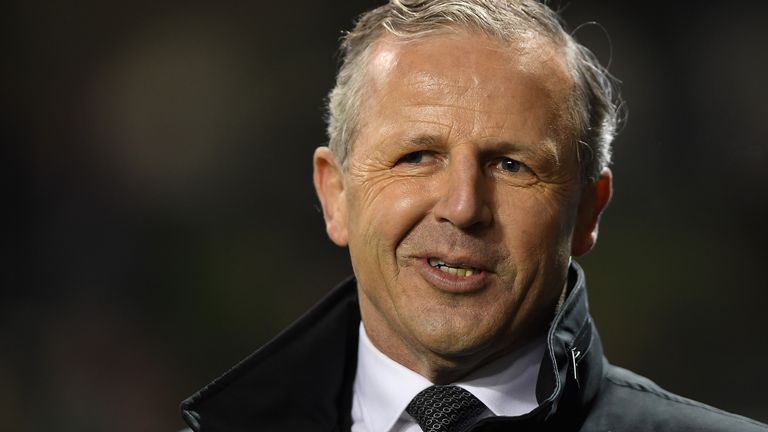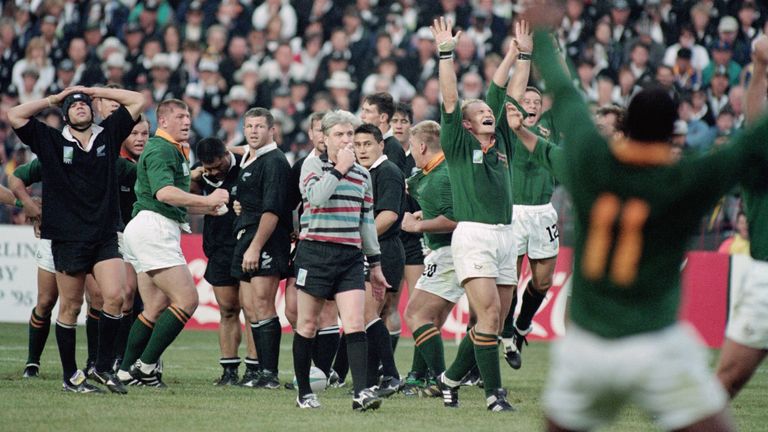Sean Fitzpatrick on the one that got away: Rugby World Cup final 1995
How the people of Johannesburg helped turn the screw on the All Blacks - hear the story on 'The One That Got Away' podcast

Wednesday 29 April 2020 15:39, UK
Former All Blacks skipper Sean Fitzpatrick talks exclusively to Sky Sports about defeat in the 1995 Rugby World Cup final to South Africa, food poisoning, and the effect of Nelson Mandela...
Fitzpatrick won 92 Test caps for New Zealand between 1986 and 1997, became a world champion on home soil in 1987, won a series against the British & Irish Lions in 1993, and captained his country to two Tri-Nations titles in 1996 and 1997.
However, for all the successes he experienced - and he was one of the finest hookers to ever grace the sport - it's a defeat in June 1995 in Johannesburg, South Africa, that he thinks about the most.
Click to subscribe to The One That Got Away on Spotify | Apple Podcasts | Spreaker
All Black skipper at the time, Fitzpatrick and New Zealand headed into the World Cup final against hosts South Africa as enormous favourites.
Rugby's first and second World Cups in 1987 and 1991 were shorn of the Springboks as a result of the international sports boycott due to apartheid. The sport's third edition of the tournament in 1995 marked their first involvement.
Joel Stransky would win the game in extra time with a 30-metre drop-goal and at the conclusion of the final, South Africa president Nelson Mandela emerged - clad in Springbok kit - to pass the William Webb Ellis Cup to skipper Francois Pienaar in a near-unbelievable symbol of the nation's progression.
It has gone down as one of the most iconic moments in the history of sport, and an image that will never be forgotten.
"As I get older - I'm 56 now, and it's a few years on since that day in 1995 - I feel very privileged to have been part of that particular game," Fitzpatrick told Sky Sports.
"I used to say there weren't many days that go by when I didn't think about that World Cup final.
"But I suppose when you look back on things you achieved or not, you think - what could I have done differently? And I think a lot about that.
"The one that got away? That is one that got away from us. We had an opportunity a couple of times to win that game before extra time and we didn't take them.
"I don't think we played our final the week before, I think we were as ready as we could be. Tactically, we probably got it wrong, and Kitch Christie [Springbok head coach] did a great job of shutting us down.
"But at the end of the day, it was 12-12 at full-time, and three points in extra time by Joel (Stransky) was the difference.
"It changed a nation and I feel privileged to have been a part of it. In terms of sport uniting people, that is probably one of the greatest events.
"Francois Pienaar did a phenomenal job and continues to in that space, and as for the great man - if not the greatest man I've ever met - Nelson Mandela - the power that he brought into that stadium on June 25, I'd never experienced anything like it.
"You stood there listening to them chanting: 'Mandela! Mandela!', as he walked down the tunnel wearing Pienaar's No 6 Springbok jersey. It just showed the power of a man, and how he saw that event as an opportunity to unite a country."
Click to subscribe to The One That Got Away on Spotify | Apple Podcasts | Spreaker
'The hotel became hostile'
In 1995, the All Blacks beat everybody they faced in their run to the final, including annihilating England 45-29 in the semi-finals in a remarkable display at Newlands which included four tries from the late, rampaging Jonah Lomu.
They had earlier put 48 points past Scotland in their quarter-final, while Ireland and Wales were also destroyed during the pool stages, conceding 43 and 34 points respectively. The All Blacks also put a remarkable 145 points past Japan - still the most points recorded in a World Cup Test.
South Africa meanwhile had been far less striking in their run to the final. Indeed, France had thought they had beaten the Boks late on in the semi-final, only for a try to be disallowed.
Yet in the tournament's showpiece, the All Blacks could not score a try and the Boks clinched it. Stories emerged afterwards that a large proportion of the All Blacks squad had been violently ill in the days leading up to the final.
"Straight after the semi-final [in Cape Town], we hopped on a plane and went back up to Johannesburg to maximise the benefit of being at altitude," Fitzpatrick said.
"To be honest, after the game it was: 'Job done boys, outstanding. Well done, well played Jonah', and then from that moment on the Sunday morning when we woke up, it was like everything had changed.
"I said before that you look back on things you could have done differently, we probably shouldn't have gone to Johannesburg, we probably should gone somewhere else just to be away from the people.
"But I wanted us to immerse ourselves in the excitement of the final, realise what it's going to take to beat South Africa.
"Everything turned when we arrived back in Johannesburg into our hotel, which we'd been in for five or six weeks.
"I can remember opening the curtains on Sunday morning at the start of this most incredible week. Opposite us was this construction site, and draped down the walls was this big banner that we could all see and it said: 'The Bokke is going to kill you.'
"We'd spoken about it, how we were going to deal with the week, and with that we wanted to be amongst the public. We wanted to go to breakfast in the main restaurant of the hotel, have lunch there too.
"But honestly, wherever we went and wherever Jonah Lomu went, there was a mad crush to get to him. People just wanted a piece of him and it obviously became a distraction that we had to get away from.
"What Mandela did to say: 'One team, one country', united them and you could feel that. It almost became like a siege mentality. And it becomes quite hostile.
"And it was quite hostile in South Africa I can tell you! You go to breakfast in the morning and these women would say: 'Fitzpatrick I hate you! We are going to kill you on Saturday!'
"But that was just the way it was. They were desperate to do everything they could to help their players win that final.
"Before that week, we had amazing security detail, our own floor in the hotel, no phone calls could come through to the rooms, there was no car alarms previous to that week.
"And then the hostile environment changed everything. We had phone calls coming through to our rooms, you literally had to pull the cord out of the wall to stop that. Car alarms going off all night. It was a bit strange.
"But we love challenging situations and that's the way it was.
"On the Thursday, we decided that after training we would move into our own team room and have all of our meals away from the public.
"And it was probably one of our mistakes because on the Friday morning, basically 21 of the 26 players were sick. Colin Meads, the great man himself, couldn't get out of bed. He was very sick.
"And that's when we realised we had an issue. Luckily, everyone bar Jeff Wilson was right by the Saturday, but it just proved a distraction we didn't need in terms of the preparation. We didn't have a team run on the Friday.
"I'm pretty pig-headed and I was so determined that this bit of food poisoning, diarrhoea, whatever it was, wasn't going to stop us trying to create history. You don't get opportunities like this.
"That was the attitude I wanted the team to see."
A case of foul play?
Rumours have persisted over the ensuing three decades that the squad were poisoned in South Africa before the final, with stories of projectile vomiting, food poisoning, contaminated drinking water and even a mystery waitress suspected called 'Suzie'.
All Blacks head coach Laurie Mains even hired a private investigator after the final, while he and a former bodyguard to Mandela, Rory Steyn, believe betting syndicates may have been behind a plot to poison the squad, although nothing has ever been proven.
Either way, it is one of the most controversial episodes in rugby history, and one which has never really been properly explained. Does Fitzpatrick believe there was foul play?
He said: "There was definitely food poisoning. And the question is whether it was on purpose or not. For me, I don't know and to be honest I don't really care.
"But we definitely had food poisoning and it did have an effect on us. But at the end of the day, we will never know if there was a Suzie or not.
"Laurie (Mains) was adamant that there were underhand things going on."
Click to subscribe to The One That Got Away on Spotify | Apple Podcasts | Spreaker









